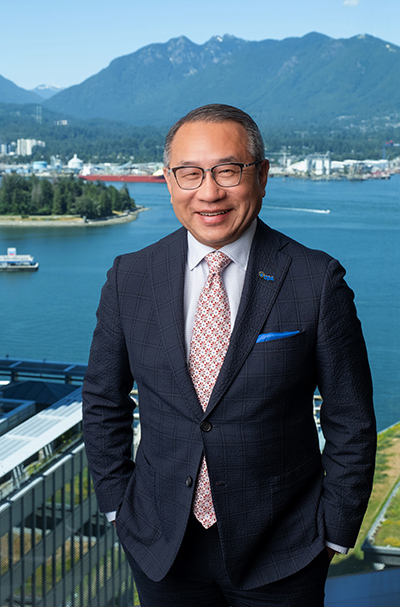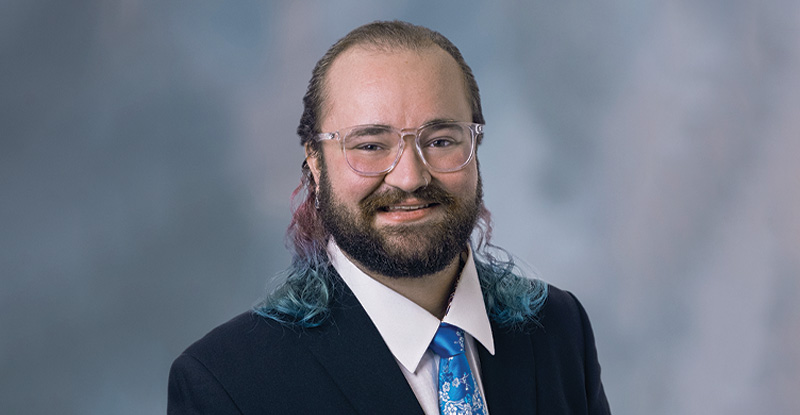
Peter Guo, CPA, CA, shares his thoughts on opportunity, belonging, and the value of the CPA designation
“I’m not sure I should even be here,” says Peter Guo with a chuckle, as he looks back over his career and some of the twists and turns that got him to where he is today.
The founding partner of MNP’s enterprise risk services practice in BC and CPABC’s new board chair likens the components of his career to a jigsaw puzzle, an analogy inspired by his wife Brenda’s childhood hobby.
“Brenda became so good at jigsaw puzzles that she used to do them upside down,” Peter explains. “I think life can feel like that sometimes—you can’t see the final picture, and you don’t always know how one piece is going to fit until another piece comes along.”
What never changed, however, was the lens through which the picture emerged.
“My lived experience as an immigrant has shaped my view of the world,” he says. “I’m proud to serve as CPABC’s first Chinese-Canadian chair, and it’s not lost on me that less than 100 years ago, the opportunities for many immigrants, including the Chinese, to become any sort of professional in Canada—let alone a board chair—didn’t exist.”
Having moved from Taiwan to Canada in the early 1970s (with a stopover in Germany while his father completed his PhD in civil engineering), Peter says he has seen how opportunities and barriers often intersect.
“I’ve found that opportunity usually comes as a result of hard work, but sometimes it just takes being in the right place at the right time—and often the context of society has to change before an opportunity can be realized,” he says. “Dad was an engineer and Mom was a nurse, and they both struggled to get hired in their respective fields when they got to Canada. One person after another turned them away. If they were given a reason, it was because they didn’t have Canadian education, experience, or credentials—or because they spoke broken English.
“I remember both of them enrolling in so many adult English courses to strive to improve their skills,” he continues. “It was their fourth language, as they already spoke Mandarin, Hokkien, and German. For an educated couple with two young boys, this was another obstacle to overcome in a new land.”
Still, his parents persevered. And, as is the case for many newcomers, this meant working entry-level jobs for many years. Even when his father eventually became a professional engineer in Ontario, he was relegated to junior positions, while Peter’s mother found work on an auto parts assembly line.
It wasn’t until his father got a job with the World Health Organization in Seoul, Korea, that opportunity and expertise aligned. It’s one of the reasons Peter describes the family’s move to Korea as life-changing—both for the family and for himself.
 “While living in Canada, I’d pretty much disavowed my Asian heritage,” he says. “You could count the visible minorities at my public schools on one hand, and I was constantly told that I didn’t fit in. By contrast, in Seoul, I attended an international school with kids from all over the world and all walks of life—so many countries, cultures, religions, and values. I started to realize it didn’t matter where I came from. It took this incredibly diverse environment to help me realize that it was okay to be my Asian self—that was so powerful.”
“While living in Canada, I’d pretty much disavowed my Asian heritage,” he says. “You could count the visible minorities at my public schools on one hand, and I was constantly told that I didn’t fit in. By contrast, in Seoul, I attended an international school with kids from all over the world and all walks of life—so many countries, cultures, religions, and values. I started to realize it didn’t matter where I came from. It took this incredibly diverse environment to help me realize that it was okay to be my Asian self—that was so powerful.”
While his time in Korea helped him reclaim his identity, Peter attributes one of his signature skills to his early years in Canada.
“People who know me say that I have the gift (and the curse) of gab,” he laughs. “As one of only three Chinese kids in school (my little brother was one of the others), I had to develop some survival techniques. I could fight or run fast, but I learned very quickly that it was better to think on my feet and talk my way out of difficult situations.”
What started as a coping mechanism soon became a passion.
“I really like meeting people,” says Peter. “And being comfortable talking with people has opened the door to many unexpected opportunities and lots of learning in my life—including my pursuit of the accounting designation.”
After graduating from high school in Korea, Peter returned to Canada to pursue a bachelor of science at the University of Toronto, with hopes of a career in medicine.
“This decision was partly influenced by my parents,” he recalls. “Like many immigrants, they saw becoming a doctor as the peak aspiration for their children.”
While his studies made for some unique experiences (including raising colonies of blood-sucking insects and extracting different DNA samples), Peter says he soon found himself questioning if he was on the right path.
“I enjoyed the lab work but not the solitude, so I compensated by getting involved in extracurricular activities at university,” he says. “But then these activities took a toll on my grades—and, frankly, I was barely able to stay in school!”
He stuck it out, however, and it was while completing his undergraduate degree that his puzzle started to take shape.
“I joined student government, and that was my first real brush with organizational culture and board service,” he explains. “Obviously, there was a social component that really appealed to me, but I also saw that we could create something as student leaders, and that ignited a fire in me.”
Thus inspired and equipped with a life sciences degree, Peter decided to enter into a new graduate program at the University of Toronto’s Rotman School of Management. This opportunity gave him the chance to earn an MBA while completing required accounting courses and getting paid as a co-op student at an accounting firm.
“It meant furthering my education and becoming a professional—honouring my parents,” he says. “I didn’t know anything about accounting, but I saw the intrinsic layers of value in the trifecta of academic credentials, work experience, and a professional designation.”
Starting in the assurance practice of EY’s Mississauga office, Peter says he quickly noticed that the firm had a lot of pharmaceutical and biotech clients. It was a perfect opportunity for the science grad and soon-to-be accountant.
“Once the partners realized I could talk about DNA, RNA, and proteins and understand the technical jargon in scientific reports and investor pitches, I got sent out to a lot more clients,” he says. “Suddenly, feeding all of those blood-sucking insects meant something!”
In 1997, Peter earned his designation in Ontario and moved to what was then Price Waterhouse. He and Brenda got married the following year and moved to Vancouver three days after their wedding.
“We jumped on a plane so Brenda could finish her medical residency at UBC,” he says. “I joined the information systems risk management practice at Price Waterhouse, and worked on financial audits, as well as system implementation, risk, IT audit, and consulting projects.
“In the Y2K era, there was an overwhelming demand for large systems and business process improvement skills,” he continues. “And in the ‘dot-com’ era that immediately followed Y2K, I was able to bridge industry experience, because biotech and tech companies have some inherent similarities.”
Shifting his focus to the tech sector also required him to expand his knowledge, and he subsequently pursued and obtained several IT certifications.
“As an accountant and an IT guy, I often say that my wife won the nerd lottery,” he jokes. “But in all seriousness, my diverse training has been instrumental to my success, teaching me how to leverage technology in everything from strategy to functionality and workflow to cybersecurity and risk.”
This unique combination landed him an invitation to join the advisory board for Business Technology Management and Business & Computer Science at UBC’s Sauder School of Business, of which he’s still a member.
“When I first got involved with Sauder 20 years ago, accounting and technology were distinct disciplines and very siloed,” he recalls. “Now, CPAs must have skills in technology, cybersecurity, and data analytics. It’s really exciting to see how the designation continues to evolve with disruptive technologies and the opportunities and risks that they bring.”
“As an accountant and an IT guy, I often say that my wife won the nerd lottery. But in all seriousness, my diverse training has been instrumental to my success...”
Peter’s mix of financial audit, enterprise technologies, and project management experience made him a go-to person for his firm when the Sarbanes-Oxley Act was introduced in 2002.
“It was the confluence of once-in-a-lifetime regulatory change in capital markets and the public’s transparency demands on the accounting profession,” he says. “I had the chance to work on building new methodologies, tools, and service offerings at PwC, and share them with offices around the world, which accelerated my partner admission.”
In 2011, Peter was able to transfer this experience and expertise to establish MNP’s enterprise risk services practice in BC. First, however, there was a brief detour.
“Between my time with PwC and MNP, I was a stay-at-home dad to our four kids—Spencer, Charlotte, Samuel, and Casey—for a year,” Peter explains. “At the time, I wasn’t sure what I wanted to do next with my career. But looking back now, my wife and I both see this period of uncertainty as an important piece of the puzzle, because it gave me time to reflect on what really mattered to me. It also enabled Brenda to start her own clinic, as up to that point, she’d been balancing a number of medical practices with being the primary caregiver for our family.
“That year was really special… and really chaotic,” he adds with a sheepish grin. “The kids were definitely late to school more often when Dad did the drop-offs!”
During that time, he began jotting down career ideas, certain that he would not return to public practice. Then came a phone call from his friend and former colleague, Scott Crowley, with “a not-so-subtle opportunity” to join MNP and start up a new practice in BC.
“Initially, I turned him down,” says Peter, “but he asked me to think about it, and I promised I would. I owed it to our friendship to check it out.”
Over the next several months, Peter found out everything he could about the firm, even cold-calling employees and partners across the country.
“Everyone I talked to relayed the same message: MNP is very entrepreneurial,” he says. “I decided to accept the offer, because I was really excited by the opportunity to build something from the ground up, with real autonomy and solid support.”
In addition to growing the enterprise risk services practice from a party of one to a multi-faceted team with six partners across three BC offices, Peter has held lead roles with MNP’s post-secondary education and cannabis practices and completed projects for Indigenous governments and business.
“It has been my privilege to learn from so many people,” he says.
Another of his areas of long-term focus is equity, diversity, and inclusion (EDI). Peter currently serves as an executive partner sponsor of the EDI Committee for the firm’s Vancouver office. “EDI is always going to be a part of who I am,” he says. “It comes back to creating a sense of belonging. I’m a real believer that the sum is greater than the whole of its parts.”
Peter is also a member of the Greater Vancouver Board of Trade’s Diversity & Inclusion Leadership Council, and he plays an active role in CPABC’s EDI journey at the board level.
“People are multi-faceted,” he says. “That’s why it’s so important to focus on the breadth of EDI as we’re looking to attract more people to the profession. We want people to be able to be their best selves.”
He describes his passion for harmonizing EDI as one of three main drivers for his volunteerism, along with improving the immigrant experience and coaching young people.
“When I was growing up, my mother instilled in me a responsibility of giving back and leaving things better than how I found them,” he says. “I want other newcomers to Canada to feel a sense of belonging and community that my family didn’t experience in those early years.”
“People are multi-faceted. That’s why it’s so important to focus on the breadth of EDI as we’re looking to attract more people to the profession. We want people to be able to be their best selves.”
Peter’s many contributions to the community include serving on the boards of the Association of Chinese-Canadian Professionals and S.U.C.C.E.S.S. (both in Vancouver) and volunteering as a youth soccer manager and coach, a guest lecturer for UBC’s Sauder School of Business, and a business-case judge at Douglas College.
“I find it fun and engaging,” he says. “When I look at many business students, I see their potential but also their uncertainty as they try to find their way. I often tell them: ‘Once you get your CPA, it’s like being given a magic key that opens any door you could ever imagine.’”
Peter is passionate about ensuring that there are opportunities for current and future CPAs and building strong engagement within the profession and within BC communities. His advocacy for and belief in the value of the CPA designation are primary drivers for why he got involved with the CPABC Board of Directors.
“We have many important priorities over the coming year,” he says. “Nationally, we’re coming together to re-imagine a cohesive and collaborative profession, and I think our commitment to building continuity of knowledge and continuity of relationships will be key to moving forward. We’re also working on a progressive curriculum that addresses future business and societal needs. These are new and exciting puzzles for all of us to work on together.”
As for his own puzzle? Peter says it’s still not complete, and that’s okay.
“I think part of the reason I ended up where I am today is because I didn’t have a plan—and to some extent, I still don’t,” he says with a smile. “In the rich, wonderful expanse that is Canada, my opportunities and challenges have often been intertwined. Now I’m able to look back with gratitude and see how all the different pieces that once seemed so disjointed were able to click together.
“Perhaps,” he adds, “I am where I’m supposed to be now.”
Megan Reid is a communications coordinator at CPABC. This article was originally published in the September/October 2024 issue of CPABC in Focus.


